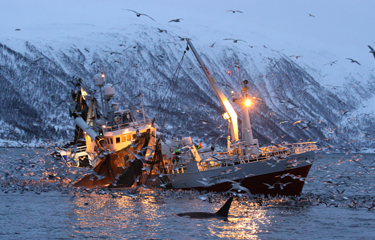A lack of international agreement between Northeast Atlantic coastal states on the management of catch levels have left four Atlanto-Scandian herring fisheries with “a high risk” of losing their Marine Stewardship Council (MSC) certificates on 30 December, the eco-label program has warned.
The MSC-certified fisheries in question are: ISF Norwegian and Icelandic herring trawl and seine (Iceland); SPSG, DPPO, PDFA, SPFPO, and KFO Atlanto-Scandian purse-seine and pelagic trawl herring (E.U. and United Kingdom); Faroese pelagic organization Atlanto-Scandian herring (Faroe); and Norway spring spawning herring (Norway).
Together, they land between 600,000 and 700,000 metric tons (MT) of Atlanto-Scandian herring annually, which is around half of the total MSC-certified herring catch. However, the absence of effective management – in particular, the quota-sharing agreement between the European Union, the United Kingdom, Iceland, Faroe Islands, Norway, Russia, and Greenland, has led to the combined catch exceeding the recommended catch levels for a number of years.
In 2019, the fisheries collectively caught 777,165 MT, some 32 percent more than the scientific advice for the year.
This year, following the catch quotas announced by the individual states, total Atlanto-Scandian herring catches are expected to exceed the scientific advice by 32 percent or 168,312 MT.
If the coastal states are to align with the 2021 scientific advice from the International Council for the Exploration of the Seas (ICES), which was announced on 30 September, they will have to reduce their catches, MSC said.
ICES has recommended a total catch of 651,033 MT for next year’s Atlanto-Scandian herring, which represents an increase of 24 percent increase on its advice for 2020. This rise is partly based on the strong 2016 year class.
The annual meeting of the Northeast Atlantic Coastal States, which started on 5 October, presents an opportunity for these nations to commit to a quota-sharing agreement in line with the scientific advice, MSC Northern Europe Director Erin Priddle said.
“Only this approach will help ensure the health of the herring stock in short-, medium- and long-term,” Priddle said. “While individual fisheries often make great efforts to improve their sustainability, ultimately, they cannot do it alone. Migratory species like Atlanto-Scandian herring don’t observe national boundaries, so we need international agreements to manage whole ecosystems in an adaptive, scientific way, rather than managing fish resources on a national basis.”
The independent assessors that have determined the Atlanto-Scandian herring fisheries’ likely suspension have also agreed that four MSC-certified blue whiting fisheries in the Northeast Atlantic should be suspended in December, again due to the lack of a quota-sharing agreement.
For the same reason, MSC-certified mackerel fisheries in the Northeast Atlantic were suspended in 2019 and have not yet been reinstated due to concerns about how the catch is managed in response to scientific data on stock levels.
As well as its recommendation for next year’s Atlanto-Scandian herring quota, ICES has issued its advice for Northeast Atlantic mackerel, blue whiting, and horse mackerel. Its suggestion is for mackerel to be set at 852,284 MT, an 8 percent reduction on this year’s quota. For blue whiting, a 929,292 MT quota is advised, which is 20 percent lower than this year’s advice, while a 3 percent reduction is proposed for western horse mackerel at 81,376 MT.
Photo courtesy of Alessandro De Maddalena/Shutterstock







